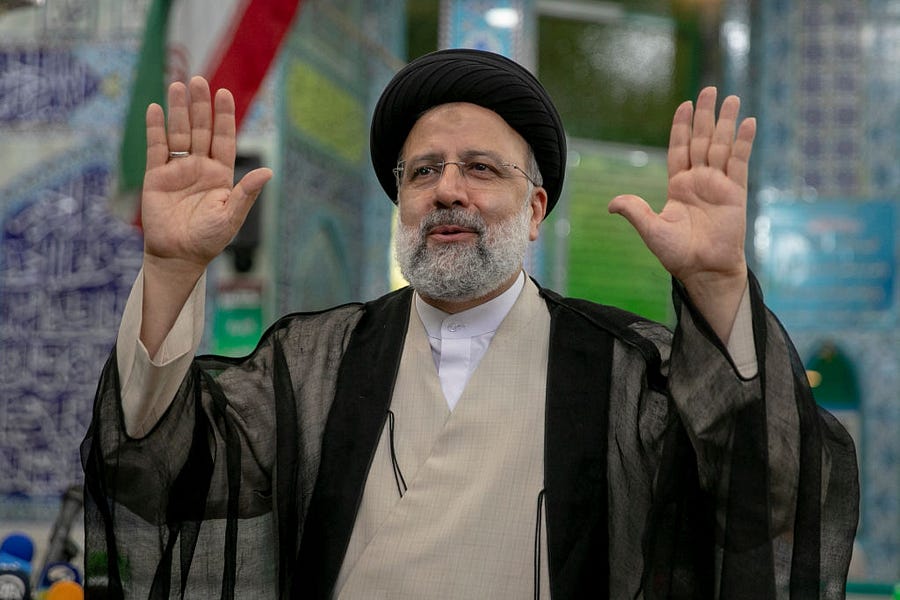When newly inaugurated Iranian President Ebrahim Raisi laid down a marker in his maiden foreign policy outing—“Palestine has been and always will be the number one issue of the Muslim world”—some might have been tempted to pay attention. After all, Palestine has been a touchstone for much of the Islamic world since the creation of the State of Israel in 1948. But after a string of military defeats and the loss of East Jerusalem, the West Bank, Gaza, and the Golan Heights, the commitment to “Palestine” has been rhetorical, financial, or at most via proxies for most. So when Raisi mouthed the rote Palestine pieties, it was little more than a nod to an increasingly marginal fight, the purview of U.N. General Assembly devotees, terrorists, Western progressive extremists, and Jew-haters.
In many ways, the trouble for Palestine—or more properly, the Palestinian Authority, as the recognized Palestinian government is known—is that the cause has become increasingly unserious, detached from the actual fate of the Palestinian people. For many, it is little more than a bumper sticker, while those more committed to at least a token effort toward a Palestinian state “from the river to the sea” are, for the most part, the Islamic Republic of Iran and its friends.
Raisi’s recent election to Iran’s top political post was greeted in Europe and the United States as yet another setback in the desperate effort to coax Iran into the community of nations. But while Washington, London, and Paris are focused on the Iranian nuclear program, Raisi made clear that his priority is elsewhere. On his first day in office, the erstwhile Iranian chief justice met with the leaders of Hamas, Palestinian Islamic Jihad (PIJ), and the Popular Front for the Liberation of Palestine (PFLP). (Observers can be forgiven for not remembering the PFLP; the Marxist-Leninist group’s big thing was hijackings, though it has claimed credit for a series of murders in and around Israel in recent years.) When all were in Tehran for Raisi’s inauguration, the new president also made time for Hezbollah’s No. 2.
Raisi’s pledge that “Palestine has been and always will be the number one issue of the Muslim world” reportedly was made to Hamas leader Ismail Haniyeh. He then echoed the same theme in his inauguration speech, announcing that, “signs of the resistance’s great victory have emerged.” The problem is, signs of the resistance’s “great victory” haven’t really emerged. They remain buried under what might be termed the resistance’s “great failure.”
The recent war between Hamas and Israel claimed lives on both sides, but did little for the Palestinian people. Instead, it served to advance Hamas’ claims for the mantle of political authority against their main rival, the increasingly sclerotic Palestinian President Mahmoud Abbas and his Fatah party. And resulted in the death of a number of key officials, engineers, and bomb-makers. Hezbollah has largely focused on preserving the Assad regime in Syria in recent years, although recent weeks have seen a number of rocket attacks on Israel, the first in 15 years. Their purpose? Perhaps establishing that Hezbollah is still a potent threat against Israel, though more in service to its own reputation and Iran’s foreign policy machinations, less to the Palestinians.
Iranian cash to the so-called liberators of Palestine, similarly, has failed to deliver prosperity to the Palestinian people. Au contraire. While Tehran reportedly upped its aid to Hamas to $30 million a month (though this seems hardly credible given Iran’s own economic dire straits), the group’s recent attacks on Israel resulted in at least $500 million in damage in Gaza, unlikely to be repaired by Iranian subsidies. Other pledges are unlikely—as always—to be fulfilled, leaving terrorists celebrating and average Palestinians high and dry.
If Iranian support for the liberation of Palestine has failed to deliver, others even more florid in their claims have managed even less. Al-Qaeda talks a big game:
… the breezes of the pride of faith have been blowing on our precious Ummah with an uprising and jihad of our noble courageous people in Bayt al-Maqdis [Jerusalem] and defiant Gaza and the West Bank and lands occupied in 48 against the brothers of the apes and pigs from the Zionist Jews …
As does al-Qaeda in the Arabian Peninsula:
We must rise up and confront the usurping Jews with whatever effort we can. In this statement, we declare our solidarity and our support for our brothers in Palestine. How we wish we were among you!
But then again, if wishes were horses and all that. Between the hot air spouted by Sunni jihadists, the empty promises of Arab leaders, the growing acceptance of Israel by once-stalwart supporters of the Palestinians in the Gulf, Iran can at least claim it’s doing something. Or at least paying others to do something. Of course, the best option for the Palestinian people would be to embrace a more serious democratic process, elect new leaders, renounce the extremism of Iranian-backed groups, and lean in to a real peace process with Israel. But that’s not what Iran and its fellow travelers are fighting for.








Please note that we at The Dispatch hold ourselves, our work, and our commenters to a higher standard than other places on the internet. We welcome comments that foster genuine debate or discussion—including comments critical of us or our work—but responses that include ad hominem attacks on fellow Dispatch members or are intended to stoke fear and anger may be moderated.
You are currently using a limited time guest pass and do not have access to commenting. Consider subscribing to join the conversation.
With your membership, you only have the ability to comment on The Morning Dispatch articles. Consider upgrading to join the conversation everywhere.